The play’s the thing, in Station Eleven, wherein they’ll catch the conscience of the king Prophet. Or could you say the comic’s the thing—Station Eleven the book absolutely terraforming two vulnerable kids’ post-pandemic worldviews? Or the play adaptation of the comic that elevates a man’s death scene from subtext to supertext? Or the ancient Lisa Loeb karaoke track unearthed by the Museum of Civilization, performed by a post-pan teenager devoid of any context? Or the Independence Day speech that endears an aspiring actor to his idols? Or the rap rendition of A Tribe Called Quest’s “Excursions” that brings more joy than awkward Christmas carols?
Patrick Somerville’s TV miniseries based on Emily St. John Mandel’s novel is a near-perfect adaptation. It very much gets its own source material, yet isn’t precious about intersecting some plot lines and excising others. The end result is imbued with both the spirit and specificity of the book, a credit to Somerville and his collaborators assigning Station Eleven the comic its appropriate level of reverence in the universe of the show, but also echoing that love of art across all of the aforementioned media. Every single song, page, or video is attached to a human life, which is what makes it survive beyond the end of the world.
Spoilers for Station Eleven.
The major challenge in adapting a book about fandom and otherwise delighting in art is in translating that interiority to a much more externalized medium. Judging by initial trailers and early episodes, I had assumed that the series would achieve this by having Dr. Eleven show up in his spacesuit, Kirsten’s (Mackenzie Davis) imagination come to life as vividly as the Independence Day speech in the second episode.
Instead of the series giving Kirsten an imaginary friend, we witness the various ways in which her obsession with Station Eleven pulls her out of other real people’s lives, and vice versa. She initially decides to hide the book away at Gil’s after an afternoon of reading has her so absorbed that she loses the toddler Alex—and it’s only later that we realize what has her so upset is that it’s a mirror image of losing Jeevan (Himesh Patel) after they fought a few years prior over her being too obsessed with the book.
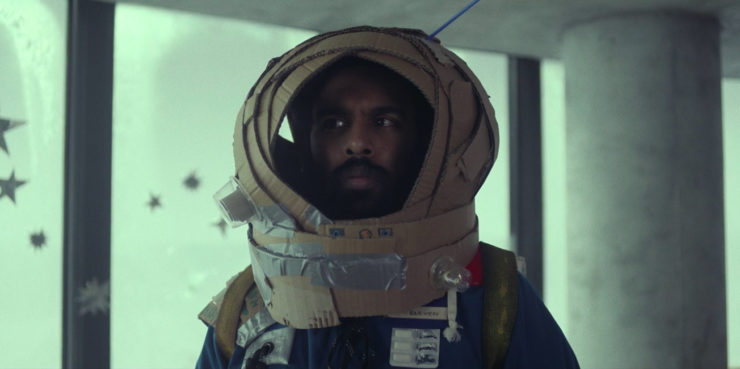
But it’s not just Kirsten who fixates: Jeevan watches Frank (Nabhaan Rizwan), suffering through withdrawal during those first hundred days, go through his own coping mechanisms with art. The scene in which he brings out what seems like a recording of radio gibberish made me hold my breath for fear of how it would drive the brothers to a breaking point—but instead, Frank begins rapping over the cobbled-together backing track, and suddenly poetry spills out of his mouth. What’s so brilliant is that before, in the flashbacks, Kirsten had tried to raise their collective morale by singing “The First Noel,” with the resulting scene the most cringeworthy moment in the entire series. It turns out all they needed was A Tribe Called Quest—and, for Kirsten and Frank (much to Jeevan’s mystified and envious chagrin), Station Eleven.
If you’re reading this piece, you’ve likely had a similar experience of such tunnel vision with a work of art that you lost sight of something beyond it. For me, it was writing fanfiction instead of filling out my college applications, and my mother telling me to get my head out of the clouds. The Station Eleven writers get that particular shame of focusing on one indulgent thing instead of what you’re “supposed” to pay attention to, and the self-discipline struggle of trying to cut yourself off from the temptation, only to unearth it from its hiding place the next time you need to read it all over again.
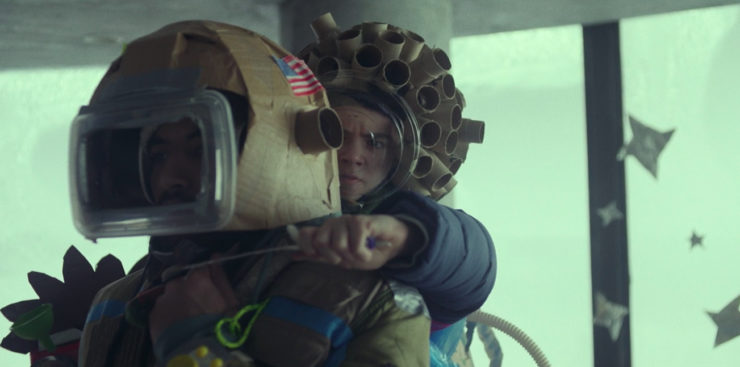
And then they took this complex mingled joy and guilt and externalized it, via Kirsten’s play and its incredible cost. Again, who among us has not had the experience of trying to adapt a beloved piece of work into another medium as a way of paying tribute to it? (If you raided my childhood home in the post-apocalypse, you’d find some cheesy Animorphs screenplays.) In a pre-pandemic world, Kirsten’s greatest fear would have been embarrassing herself with the melodrama that wouldn’t land for others and the make-believe homemade costumes. But after the world ends, her insistence on them staying one more day to stage the play leads to a desperate intruder, Frank’s stabbing, and Kirsten’s obsession with taking up the blade herself so that she would be the one to wield it the next time.
But even though Station Eleven the series has more explicit violence than in the book, the series goes to great lengths to make the case for each character’s motivation to stab, poison, steal, and abduct. There are no clear heroes or villains, just people who made deliberate choices to protect some and defend against others. What makes each of them sympathetic despite their worst actions are the glimpses into what art inspires and sustains them.
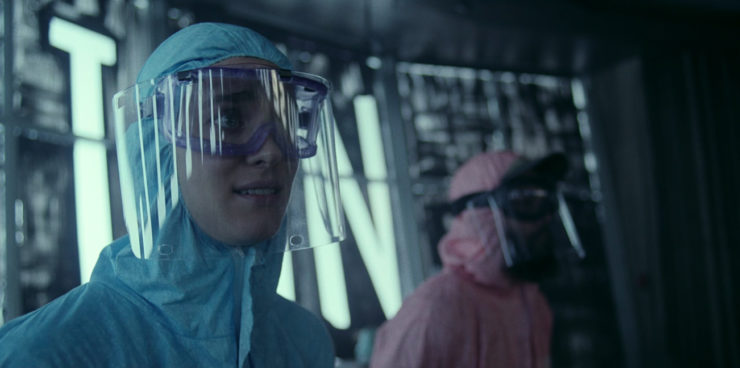
The series smartly creates tension between what in the book are only parallel plotlines for the Traveling Symphony (ever on the road) and the Museum of Civilization (a popular destination), hingeing on the Prophet’s Station Eleven-inspired prophecy. The first three episodes initially presented the Museum, via guileless messenger Brian (Enrico Colantoni), as earnestly inviting the Symphony to perform from the stance of wide-eyed fans. But it’s during his third visit the tone changes drastically: Suddenly Brian and his surprise entourage are wielding rifles, kidnapping the Symphony at gunpoint in order to spirit them to the Severn City Airport.
The most interesting change to the source material is making the SCA into an extreme quarantine state—no doubt inspired by the last few years of covid. Complete lockdown without the benefit of government assistance is an incredible privilege; but if government and society collapse, then there is the opportunity to make the extreme choice. Compared to the nomadic Symphony and other Year 20 survivors, the SCA has electricity and food and living quarters… but also barbed-wire fences, secret hospital rooms, and itchy trigger fingers. Safety and a long-lost definition of “civilization” come at great cost.
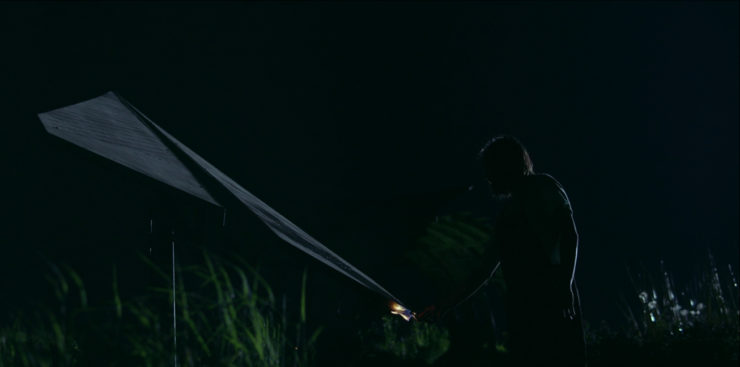
“One may smile, and smile, and be a villain,” Shakespeare’s Hamlet says in Act 1, Scene 5, after his father’s ghost reveals that it was his uncle Claudius who murdered him, acknowledging that even the most seemingly pleasant person can hide their true intentions behind a genteel veneer. The paranoia and exclusion that characterizes the SCA’s society completely recontextualizes the Museum: I had always read it as a beacon of hope, a portal to return to the past once they had collected enough curios in one place. But instead, Clark’s (David Wilmot) obsessive curation traps him in the past and alienates him from the SCA’s post-pan teenagers. Even inside the quarantine, he has isolated himself. Which is why, much as it hurts my heart to see, Tyler (Daniel Zovatto) blowing up the Museum makes sense.
By this same token, the series’ Prophet gets much more sympathy based on his own personal adolescent trauma of trying to help a passenger from Gitchegumee Air Flight 452. The man was likely immune, as all of the Year 20 survivors seem to be, yet the SCA’s unwillingness to let him in establishes early on the distrust of the outside world that would allow them to make it past those first few weeks. It also establishes their strict month-long quarantine for Tyler and his mother Elizabeth (Caitlin FitzGerald), which as we know can be its own form of psychological torture… and is what cements Tyler’s fervent obsession with Station Eleven, having nothing else to read in isolation.
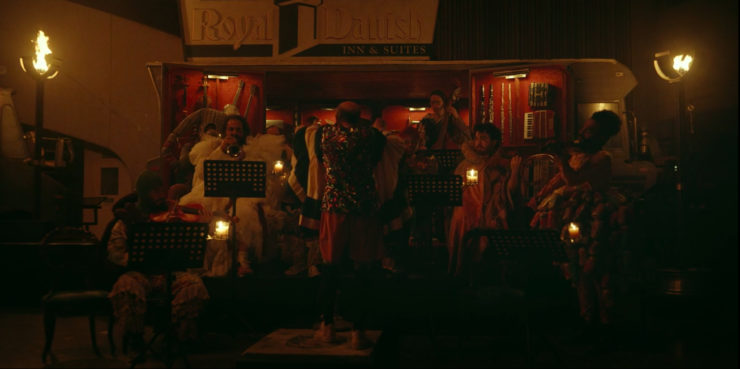
It’s Hamlet that utilizes a play-within-the-play to call out Claudius’ murder of his brother… a fact that I forgot until the finale, “Unbroken Circle,” in which Tyler and Elizabeth use the magic of live theater to talk out their traumatic estrangement. The Traveling Symphony’s imprisoned performance also serves as a lovely bookend to Kirsten’s failed Station Eleven play: Instead of Frank expressing his desire to stay in place via his character’s death scene and then unintentionally manifesting his own stabbing, Tyler gets the catharsis of wielding the knife that took away Kirsten’s first pandemic family as he processes his mother’s betrayal.
As a demonstration of art therapy, it’s fantastically fitting. As a way of making the book’s clear villain into more of a misunderstood antagonist, it serves as one of the few moments of the series that doesn’t quite land. (The other being the addition of the Red Bandanas; considering the last few years in our reality it completely tracks, but they’re onscreen far too briefly to be anything but an intriguing piece of worldbuilding.) To wit, absolutely no one comments on Tyler and Elizabeth just… walking away with his herd of brainwashed children? The lasting damage of Station Eleven as filtered through his dark lens, and how it ruptures families and turns kids into weapons, is left as a nagging plot hole.
In eliding the Prophet’s more unsavory practices, like taking on child brides in every town, the series loses some of the book’s bite when it comes to skewering celebrity culture. One of my favorite aspects of Tyler’s twisted reasoning was that he grew up getting to know Arthur Leander (Gael García Bernal) through tabloid articles; in reading about his father’s many affairs with women who were not his mother, he absorbed that entitlement to any woman or girl he wanted. Similarly, Elizabeth’s belief that they were spared because of some moral bullshit clearly contributed to the scaffolding of the book Prophet’s cult, whereas the series has his preachings pulled entirely from Station Eleven itself.
Cutting the celebrity through line also omits Jeevan’s unsuccessful period as a paparazzo, stalking the man he would eventually try to save onstage, though his plotline does still intersect with Arthur and Tyler in “Dr. Chaudhary,” when the disturbingly young pregnant woman Rose mentions waiting on her baby daddy David, only to be visited posthumously by an actual child. It took me way too long to parse that this was one of the Prophet’s Undersea acolytes sent in the not-so-proud papa’s stead, to officially abdicate all responsibility for his child.
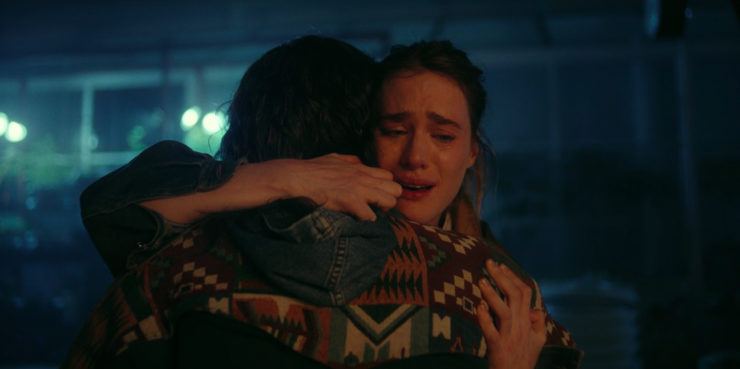
“No one gets anyone back from before,” Kirsten tells Tyler in order to guilt him into taking on the mantle—her role—as Hamlet. That’s what makes it so fitting that Kirsten loses her copy of Station Eleven for good a mere beat before she finds Jeevan again. You see it in her face: Kirsten makes her peace with losing the book that has influenced her entire life, because the Undersea child needs it more, and anyway she’s already got it memorized. Then she recognizes Jeevan, and it becomes clear that she’s been given an unexpected gift: to trade her nostalgia for the rare opportunity to make new memories.
For all that these two clashed during the start of the pandemic, unable to understand each other across the chasm of a child’s obsession with a comic book and an adult’s grief over his sacrificed dreams, the moment in which they reunite in Year 20 cannot be summed up any better than Miranda’s (Danielle Deadwyler) toast: I was late, or you were early.
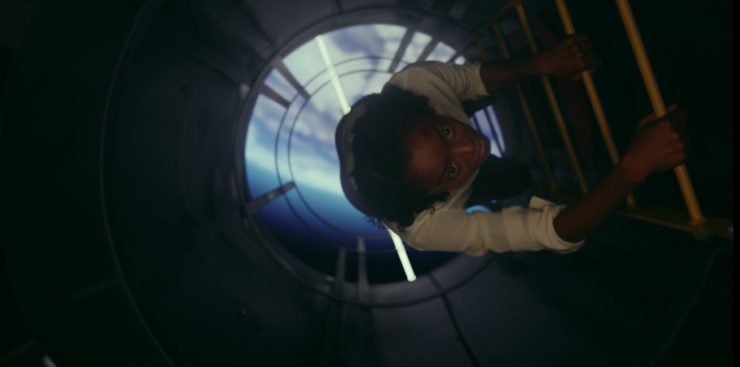
I would be remiss in not touching upon the final fate of Station Eleven’s creator; I should have known that “Hurricane” would not be the last we saw of her, slowly succumbing to the flu in Malaysia. Instead, the creators added in a final coda that ties back to the Severn City Airport: It is Miranda, the artist who really shines in Logistics, who works against her every professional instinct in order to keep Gitchegumee Air Flight 452 from entering the airport—thus sparing Arthur’s son, wife, and best friend, and indirectly creating the Museum of Civilization.
Miranda’s tearful conversation with the pilot is so moving, as she begs him to make a sacrifice for the lives of people he will never know, delivered by a stranger halfway around the world. Ironically, Miranda will die not knowing how her great work of art influences two children twenty years later; but she gets to spend her final moments with Dr. Eleven and the relief that she did something to alter the course of someone’s life.
And then Station Eleven the series wraps up with the Traveling Symphony performing the dearly departed Conductor’s (Lori Petty) favorite song, “Midnight Train to Georgia.” But instead of our collective imagination resurrecting Gladys Knight & the Pips, as with every other non-diegetic performance in the series, we hear their actual voices singing—the only time that a performance is not about trying to recapture the magic of the past, but instead about putting a new spin on the future.
Natalie Zutter chooses to take Flight 452 as a ReBoot reference, please don’t try and tell her otherwise. Retell her your favorite parts of Station Eleven here and on Twitter!










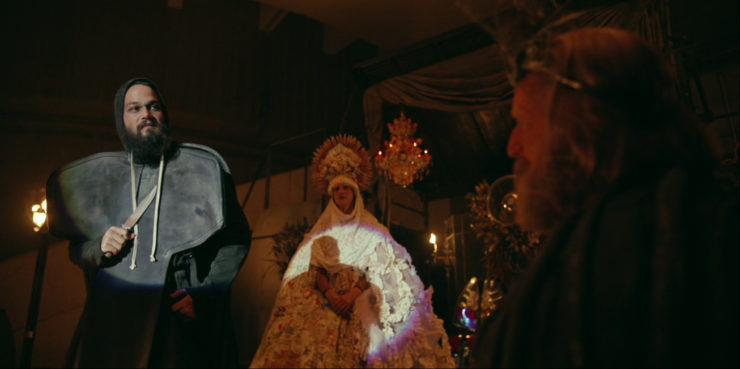
What do you mean “near-perfect adaptation” – they changed so much! Not just trivial stuff, but also – IMO – essential stuff to the story.
No, no, that’s not right. The actual child “David” who visits the birthing centre is Tyler. This is still Year One post-pan. He’s still a decade away from becoming the Prophet (in a different scene, Cody tells adult Kirsten that David/Tyler’s been building the Undersea for ten years). In fact, as young Tyler leaves after Dr Deborah tells him gently that baby Alex would be safer left at the centre, Jeevan says to Dr Deborah “Well, I guess he’s not the father.” And in episode 8 when adult Kirsten confronts Tyler with the knowledge that she knows who he is, and he begins quoting Station Eleven in response, one of the image flashbacks show the child Tyler walking into the birthing centre.
Also, in episode two when Tyler talks about Rose, he says, “She was a good mother”. That led me to surmise that Rose had been for Tyler what Jeevan had been for Kirsten—an adult who’d found a lost child and cared for them.
Haven’t read the book, so not sure what I’m missing out on. I got tired of the series after the third episode, when I started wondering why so many actors survived the flu but apparently no engineers did. Nobody who knew how to run power plants, or make gasoline?
Watching the horse-drawn cars and campers made me wonder how they kept their tires inflated and intact for ten years? That was it for me.